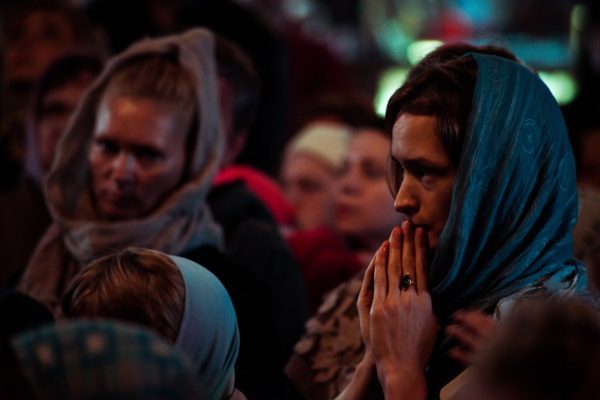A small but always persistent discipline is a great force; for a soft drop, falling persistently, hollows out hard rock….
When patience greatly increases in our soul, it is a sign that we have secretly received the grace of consolation. The power of patience is stronger than the joyful thoughts that descend into the heart. (St. Isaac the Syrian, Homily 48)
When Jesus told His followers that they must eat His flesh and drink his blood, St. John tells us that many were offended, calling it a “hard” saying. The text tells us that many of his disciples no longer followed him after that point (John 6). Only the twelve disciples stayed with Him. But they stayed not because they understood him or because the saying seemed any less hard to them. They stayed because they had nowhere else to go, nowhere else where they could hear the words of life. Jesus had the words of life, and even if he offended them by saying something so ridiculous and patently offensive as “you have to eat me to be saved,” they weren’t going anywhere.
I’m sure it was much easier to follow Jesus a day or two earlier, when Jesus in the temple area and on the Sabbath healed a man who had been paralyzed for 38 years. It’s so much easier to follow Jesus when we see His power, when we hear words that comfort us, when our experience meets our expectations. This, I think, is the joy that St. Isaac is referring to above, the “joyful thoughts that descend into the heart.” When our prayers seem to be answered, when tragedy is avoided, when God seems so close to us because everything is going pretty much as we think it should, these are the times when a certain joy and confidence descends into our hearts and we feel that we could follow Christ anywhere. It is at times like this when we wonder how anyone could not follow Christ. In those moments of joy and confidence we feel encouraged and consoled, we feel as if nothing could ever shake us from our confidence in Christ.
However, such moments or seasons of confidence, of joy descending into our hearts, of everything seeming to work out as our theological ideals told us they would—prayers answered, needs met, and all sadness far away—these times of joyful confidence in God never last very long. They are great when they happen. In fact, it is probably necessary for us to have such moments or seasons of this kind of consolation (the consolation of joyful confidence) occasionally through our life, especially when we are young. A certain energy or power comes from such experiences, an energy or power that helps us commit to Christ, helps us say confidently to ourselves, “Yes, I will follow Christ!” It is a power that enables us to take big risks and make big changes and radical acts of repentance in our lives.
But deciding to follow Christ or repenting from a besetting sin is only the first step in a very long journey. St. Isaac likens this walk with Christ to a soft drop that hallows out a hard rock. It is not the gush of water caused by a sudden cloudburst of enthusiasm that actually changes us (although it often sets a direction). It is not the dramatic move that forms us into the image of our Master. Rather, it is the “small but always persistent discipline” that carves away the hard stone of our sinful passions and smooths our rough edges and undermines the foundation of our delusions about ourself, about the world and about God. This is why St. Isaac tells us that patience, actually, is the evidence of God’s consolation received secretly, or in a hidden way, in our souls.
When we can patiently endure a small, persistent discipline, then we know that God has secretly given us the Grace to grow in Christ, to grow just a little bit more, to let fall away another little bit of the world that clings so tenaciously to us. Patience is what the Grace of Christian growth looks like.
Both the words “small” and “persistent” are, I think, key to manifesting the grace of patience. A common newbie mistake in the Christian life, a mistake that I constantly make, is to seek for patience in the big things, to expect to be persistent in some big change in my life and to consider some small thing to be too easy or not a worthy offering, or even to think it is somehow beneath me (I sometimes foolishly think to myself, “I’m better than that.”). But what we all soon find out is that the Grace that we expected to help us overcome the large matters just doesn’t manifest when we think we need it and our big commitment leads us only to a big failure.
Perhaps this happens because of our pride. Or perhaps it happens just because it is the nature of the spiritual life: a seed grows slowly. Patience and persistence grow bit by bit, not in leaps and bounds.
If we want to cultivate the secretly given consolation of patience, I suggest we start small. It is actually much better for our growth in Christ to say, for example, the Lord’s Prayer (slowly and with attention) every morning and every evening for several years, than it is to attempt a thirty-minute prayer rule that we keep for a few weeks, then keep poorly for a few more weeks and then give up entirely in frustration. A certain brother once told me that fasting started to really mean something to him when he started giving up cream in his coffee. Such a small matter, but for him, consistently followed, had amazing results. It seemed that every cup of coffee throughout the day became a moment of offering, a prayer, a recommitment of his life to Christ. As St. Isaac says, it’s the small and persistent drop of water that hollows out the hard rock.
Certainly, there are also times when God’s Grace is such that we can, we must, make bold moves, make radical changes in our lives. A bank robber must stop robbing banks—even if for the rest of his life he struggles with temptation every time he passes a bank. Similarly, those living in inappropriate sexual relationships have to stop it. These are the bold acts of repentance that set the direction—or in many cases reset the direction of our lives. However, it is in the day to day, patient continuance in doing good (Romans 2:7) that the real progress in spiritual life takes place.
It is never easy in this broken world to grow in Christ. However, it’s not nearly as difficult as we imagine. Grand gestures or great sacrifice is seldom called for: doesn’t Psalm 50/51 tell us that sacrifice is not what God is looking for? What is God looking for? God is looking for a broken and humble heart. Sometimes, it is actually our failures, our inability to give God the big sacrifice that we think He wants that produces in us the humble heart that God is actually looking for. A humble heart is not afraid of the small thing. A humble heart can accept a small discipline and keep it faithfully. A humble heart, by a patient persistence, hollows out the hardest rock and softens the hardest heart.




















